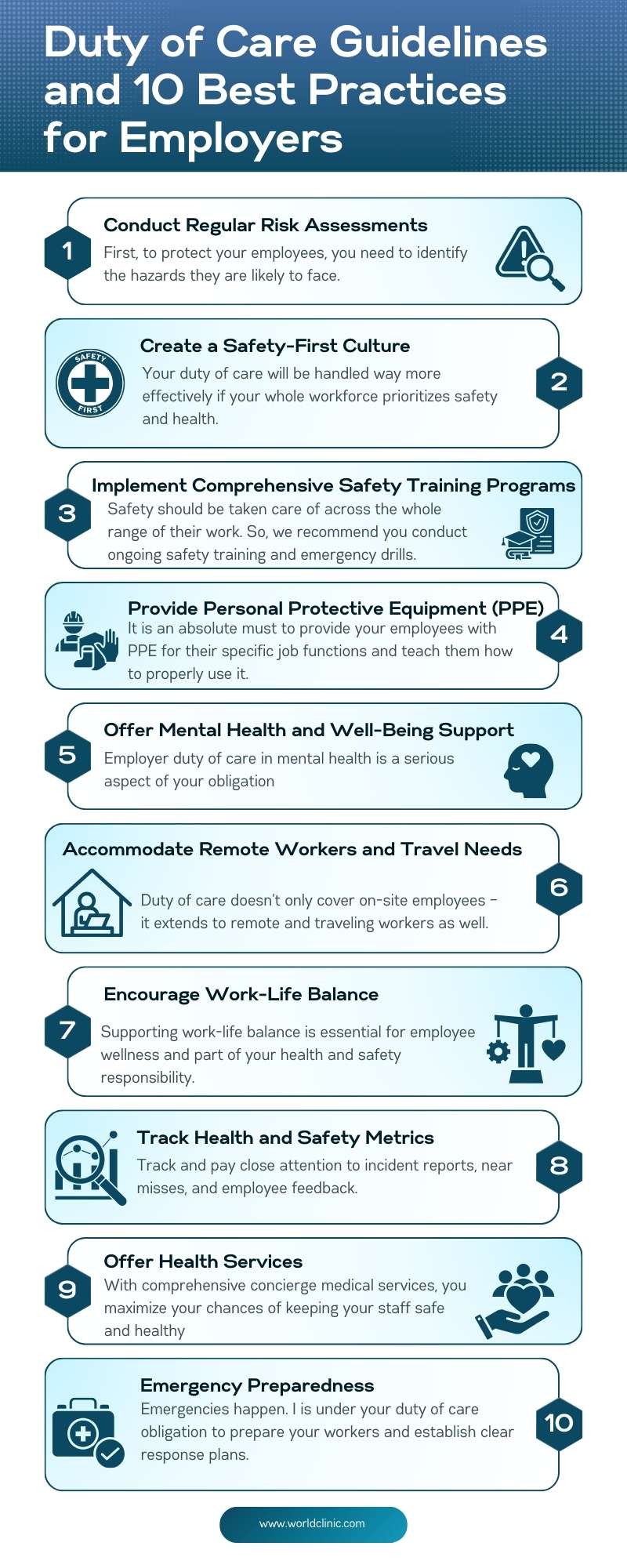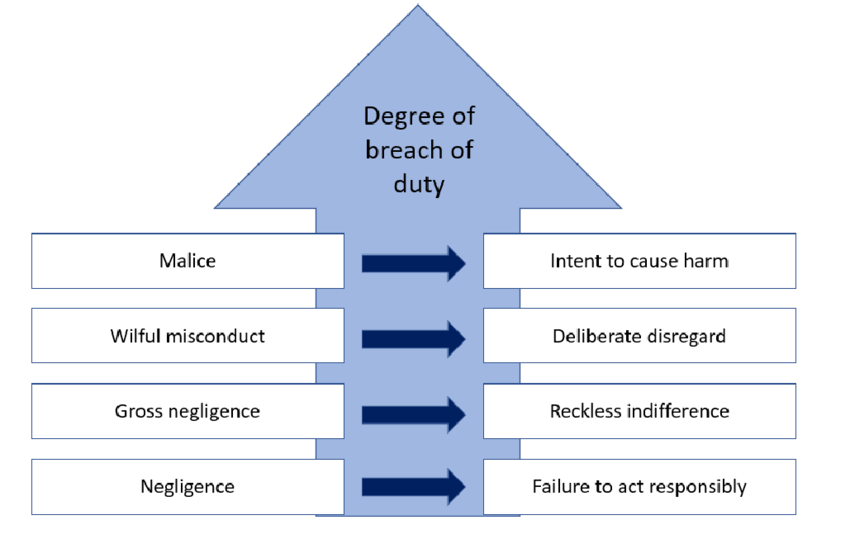The well-being of employees is becoming more and more important to businesses in all industries. Companies have started to prioritize the health, safety, and supportiveness of work environments.
As a result, the duty of care that business leaders hold becomes more important than ever. This duty is all about doing what is best for the company, which means supporting the workforce in all possible ways, including both their physical and mental health.
Happy employees mean a happy company.
Duty of care comes with a lot of legal and moral responsibilities. They can be tough to navigate, so we’ve created a guide to help you through this process.
In this blog, we’ll tell you all about the duty of care definition, best practices for handling it, as well as the breach of duty of care. Without further ado, let’s begin.
What is Duty of Care?
Duty of care is defined as the fiduciary obligation that directors and officers of companies have. Within this duty of care responsibility, it is their legal and moral obligation to protect the health, safety, and well-being of their employees.
From a legal perspective, it is all about making sure directors and officers of a corporation make decisions in good faith, meaning that all their decisions must be in favor of whatever is best for the company and its employees.
For example, within the duty of care, employers can be obligated to deliver safety training for their manual workers, make sure workstations for office staff are ergonomic, or provide mental health support to remote workers.
This even extends to creating policies that take care of employees during business travel.
If there is a dispute that needs to be solved through court, the court will not tolerate bad faith, gross negligence, or bad processes. These are grounds for further investigation, looking into whether there was a breach of duty of care.
We will discuss all of these concepts in our comprehensive guide to duty of care. Let’s start by talking about why it is important.
The Importance of Duty of Care in the Workplace
Safety is crucial everywhere – there is no doubt about it. OSHA regulations also state that employers have a responsibility to provide a safe workplace for their employees. So, duty of care is crucial for reasons too many to count on one hand.
The duty of care isn’t just an obligation – it is also good for business.
From improving your employee retention to reducing absenteeism and achieving better productivity across your workforce, employer duty of care has many direct benefits for your business.
If you create a safe, supportive work environment for your employees and keep them healthy with corporate health services or employee health benefits, you’ll give them all the reasons for wanting to stay with your company.
Responsibilities of Employers Under Duty of Care
To make it easier for you to understand duty of care, we’ve prepared a list of the key responsibilities you, as an employer, would have to cover under this obligation. Your purpose is to make sure that your employees are safe and healthy, and you do it through:
- Creating a safe workspace
The first step here is to complete a thorough audit of your workplace to find any safety gaps you need to fill. Next, you should come up with safety guidelines that are specific to your industry, site, and more.
- Training your staff on health and safety
Once you have your safety guidelines identified, you’ll need to educate your employees on how to follow these rules. Keep this up regularly and teach your workers about proper equipment use, as well as emergency responses.
- Giving your workers mental health support and resources
Having covered the physical health and safety aspects of your employees, you need to start thinking about their mental health. Through regular mental health check-ins, you can understand the stress your workforce is feeling and give the appropriate support.
Pro tip: Encourage work-life balance – set clear work-hour boundaries, especially for remote workers.
Duty of Care Guidelines and Best Practices for Employers

Although duty of care has tons of benefits and is great for executive risk management, it is also tough to keep up. That’s why we’ve put together a list of actionable steps and best practices you can use to meet your duty of care responsibility.
Let’s talk about our 10 best strategies.
1. Conduct Regular Risk Assessments
First, to protect your employees, you need to identify the hazards they are likely to face. So, hold regular risk assessments to understand how well your current safety measures are working.
Risk assessments should be done periodically as well as after major changes to the work environment.
Remember to document all findings and address all the issues that come up immediately. Ultimately, you need to make sure that you comply with health and safety regulations.
2. Create a Safety-First Culture
Next up, let’s talk about instilling a safety-first culture in the workplace. Your duty of care will be handled way more effectively if your whole workforce prioritizes safety and health.
Your organization’s leadership should encourage open communication about safety concerns. This way, your employees will feel free to speak about any hazards they come across.
To truly make safety a core value for your organization, we recommend you:
- Involve your employees in safety committees
- Recognize those who contribute to creating a safer environment
- Hold regular safety meetings with your staff to keep them engaged and educated
3. Implement Comprehensive Safety Training Programs
Holding an annual executive physical is not enough to keep your staff healthy and safe. Their safety should be taken care of across the whole range of their work. So, we recommend you conduct ongoing safety training and emergency drills.
Your staff should know all about proper usage of equipment, how to identify hazards, and much more. To keep your training programs engaging, you can use a combination of:
- Workshops
- E-learning modules
- Practical demonstrations
4. Provide Personal Protective Equipment (PPE)
It is an absolute must to provide your employees with PPE for their specific job functions and teach them how to properly use it.
Additionally, your staff should know how to inspect their PPE for wear and tear to replace it whenever needed. This is one of the best ways to prevent injuries and protect your staff.
5. Offer Mental Health and Well-Being Support
Employer duty of care in mental health is a serious aspect of your obligation. We recommend you provide resources like:
- Employee Assistance Programs (EAPs)
- Counseling services
- Workshops on how to manage stress and be resilient
6. Accommodate Remote Workers and Travel Needs
Duty of care doesn’t only cover on-site employees – it extends to remote and traveling workers as well.
For your remote workers, you should offer ergonomic resources so that they can create a safe home office environment, both physically and mentally.
For your employees who travel often, you should provide comprehensive travel risk management programs, access to telemedicine in case of emergencies, and more.
7. Encourage Work-Life Balance
Having a good work-life balance is key to long-term employee wellness. So, within your duty of care health and safety obligation, you should do everything in your power to help your staff achieve it. We recommend:
- Encouraging your employees to take breaks often
- Urging them to use their paid time off to relax
- Taking care of their routines to avoid burnout
- Discouraging after-hours communication unless necessary
8. Track Health and Safety Metrics
Although an annual physical is a good place to start, you, as an employer, should take better care of your staff’s health. For example, you can monitor their key health metrics and use executive healthcare services to make sure minor issues don’t turn into disasters.
Pay close attention to incident reports, near misses, and employee feedback. You just might be able to identify some trends or areas of improvement to make your workplace even safer.
9. Offer Health Services
With comprehensive concierge medical services, you maximize your chances of keeping your staff safe and healthy. Investing in memberships for employees is a great way of fulfilling your duty of care.
Here at WorldClinic, we offer personalized healthcare solutions that give your workers 24/7 access to physicians. Thanks to telemedicine support, your employees can reach out to a doctor through phone, email, and digital platforms anywhere, anytime.
Aside from an annual executive check-up, our doctors give your workers tailored wellness programs based on comprehensive assessments. At the end of the day, your employees can get immediate medical attention to prevent injuries from becoming bigger issues.
If you’re looking to improve the health outcomes of your employees and reduce absenteeism, our memberships can be the ideal solution.
10. Emergency Preparedness
Emergencies happen, we know the struggle. It is under your duty of care obligation to prepare your workers for emergencies and develop clear response plans for events like:
- Fires
- Natural disasters
- Medical emergencies like injuries from falls
Once you have an emergency response plan in place, it will be time to hold regular drills and training sessions to make sure your employees know what to do in case of unexpected situations.
Lastly, make sure that your employees have access to all emergency equipment like first-aid kits, fire extinguishers, and more. Additionally, investing in executive health programs can help provide immediate medical attention to your workers.
Legal Dimension of Duty of Care
Under US law, duty of care isn’t just a moral obligation for employers – it is a legal requirement. You, as an employer, are mandated to make sure your employees are safe in the workplace.
One of the main laws governing the duty of care is OSHA, which has clear guidelines in place to protect your employees from hazards in the workplace.
Another important legal requirement you need to meet is the General Duty Clause from USHA, which requires employers to protect their employees from any hazards once they become aware of it.
If employers don’t meet this standard, they might face fines, penalties, or even legal action. The punishment becomes more serious if the employer’s negligence leads to injuries or illnesses of employees.
Additionally, the Americans with Disabilities Act (ADA) requires that employers provide the necessary accommodations for employees who are disabled.
Lastly, you should also know about the Family and Medical Leave Act (FMLA), which is made to protect employees who take medical leave.
Failing to comply with these legal requirements can be categorized under employer negligence duty of care, which we will discuss next.

Breaching Duty of Care: The Consequences of Duty of Care Negligence
Now that you know all about duty of care and its requirements, let’s talk about employer negligence. Within the context of duty of care negligence, employers face a risk of not only exposing their business to serious legal consequences but also financial penalties, lawsuits, and reputation damages.
While adopting duty of care, employers go through many challenges, including:
- Navigating executive physicals
- Establishing effective executive health programs
- Providing healthcare to remote or traveling employees
- Coordination issues in terms of continuity of care
All of these complexities truly put the importance of duty of care into perspective. Adhering to safety standards can help employers avoid both legal and financial risks, all of which can affect the long-term bottom line of their business.
With personalized concierge healthcare services like the ones we provide at WorldClinic, you can effectively deal with all the challenges mentioned above.
From continuous care coordination for all your employees, including remote and traveling workers to telemedicine and 24/7 access to medical care, your employees can stay safe, healthy, and happy.
Ultimately, you, as an employer, will meet your duty of care obligations and keep your business thriving over the long term.
Conclusion
Duty of care is one of the biggest responsibilities that employers face. If you comply with regulations, you will both protect your employees and avoid any legal or financial risks for your business. It’s a win-win.
From providing a safe workplace and effective training to mental health support and management of remote and traveling employees, the benefits of duty of care are many. However, if you neglect these responsibilities, you could face serious consequences.
To effectively comply with the standards of duty of care, we recommend investing in concierge medical providers like WorldClinic.
Our memberships and benefits surpass the regular executive and primary care in their customizability, comprehensiveness, and accessibility through telemedicine.
If you’re looking to meet your duty of care obligations and keep your employees safe, we highly recommend you discover our membership plans.
Frequently Asked Questions
Who is Responsible for Duty of Care?
Duty of care is the responsibility of employers, including business owners, managers, and supervisors. They must take all possible steps to protect employees from hazards and create a safe working environment.
What are examples of negligence of Duty of Care?
Negligence of duty of care can include things like failing to deliver adequate training on safety, not addressing hazards that are well-known to employers, ignoring reports of unsafe conditions from employees, not offering mental health support to workers. Avoiding these requirements can lead to employees getting injured or falling ill, which can bring about legal consequences for the business.
What does Duty of Care mean for remote workers?
For remote workers, employees should provide safe and ergonomic office setups, as well as access to any resources required to keep them healthy and secure. This also includes support for their mental and physical health.
Why do companies need to have a duty of care policy?
Policies can help employers meet their duty of care responsibilities. These documents outline the company’s commitment to the health and safety of its employees. Additionally, they set clear guidelines for maintaining a safe workplace. Aside from the moral side of things, a duty of care policy helps businesses comply with legal obligations, minimize their risks, and more.


